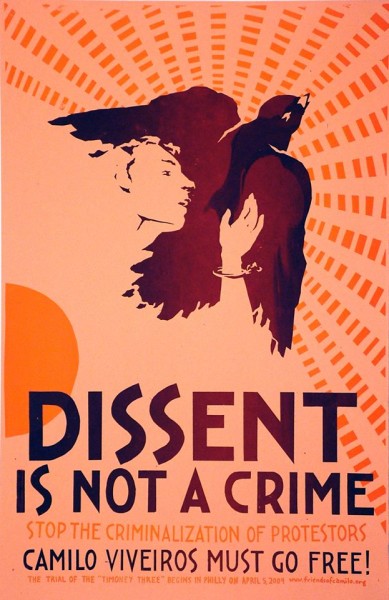
I didn’t know Camilo Viveiros until some years after he had been acquitted of all charges, after an intense 4 year legal battle, but I continue to be inspired by what he and others have gone through, putting their bodies on the line to protest systematic injustices.
In 2000, at the time working as a low-income tenant organizer in Southeastern Mass, Camilo and other activists went to Philadelphia for the Republican National Convention to protest poverty, the prison industrial complex, and the death penalty. The day he was arrested he was taking part in a march against police brutality, an issue that now, due to the brave actions of black activists and allies, the nation is finally somewhat waking up to, but at the time was still considered very controversial (at least by those who had not seen its effects first hand or with loved ones). Camilo faced spending the rest of his life in prison, charged with felony assaults against the police commissioner of Philadelphia, John Timoney, and accused of using a bicycle as a deadly weapon on a different police officer.
What happened was during a march Camilo was attacked by police, kicked and punched and his head slammed on the sidewalk until he was unconscious, detained and arrested, interrogated for 16 hours, threatened by correctional officers, denied access to medical attention for injuries from police assault, taken to a hospital after 3 days of requesting medical attention where officers (after the threat of a “joy ride” on the way there) were intimidating with Camilo every moment as he told the doctor how he had received the injuries from the police. He was put back in the prison, held in solitary for days, and accused on trumped up charges that would go on to affect the next 4 years of his life and beyond.
As more people increasingly are aware, it is a typical practice for police who commit brutality to charge those they assault with being violent or provoking a response, as a way to flip around the narrative, diminish sympathy for the victim and to cover up their own actions. During the protests hundreds of people were arrested as a part of state suppression of free speech, and while most charges were quickly dropped, others still faced serious charges, with Camilo getting the most severe charges of all the activists. They wanted to make an example of him and others, to other activists or would-be activists, that political dissent would not be tolerated.
But the case became an example of organizing against repression, with lessons learned from community organizing. People from across the country banded together in solidarity with those arrested in Philadelphia, and the groups formed included Love and Resistance in Providence and “Friends of Camilo” groups in Boston, San Francisco and Philly. In Providence, and elsewhere, local gatherings and fundraisers took place in the early 2000’s to help cover legal costs, which for working class people like Camilo were/are entirely unaffordable. Many people took part in the effort and it made an enormous difference in the outcome. A legacy of this community solidarity still exists in Providence, where the supportive social networks of Love and Resistance fueled the founding of groups like Recycle a Bike and Providence Books through Bars.
Thanks to massive grassroots support, after 4 years of fighting, Camilo was finally acquitted of all charges. As for Commissioner Timoney, he went on as a sort of professional crusher of dissent, first to Florida to repress opponents of free trade agreements, and later internationally to places like Bahrain where he was involved in offering strategy to suppress popular protests during the Arab Spring. If you have met Camilo in the past 10 years you may not be aware of this history, he doesn’t often bring it up, choosing instead to focus proactively on the many issues of current injustice. But I can see how he, like others who have been much more egregiously chewed up and spit back out by the “justice” system, still lives with the impact, and will for the rest of his life. I appreciate when now and again Camilo shares reflections from his experience, and that he remains dedicated, continuing as a community organizer and activist despite, and probably partly because of, the hardship he went through. He knows too many have been through much worse. He knows he is fortunate to be free and I can attest he spends every single day (really, 7 days a week) working to advance freedom and equality for those who are suppressed, oppressed, and born into systems of injustice.
I deeply admire all who have taken part in direct action, putting themselves at risk for the common good, an extra challenge in the days before social media when activist actions were much more isolated from public awareness and the lack of smart phones did not provide the security and documentation that today’s activists are able to utilize. And even though it was some years ago, there are many relevant lessons to be learned for current efforts toward social change, including the critical need for organizing beyond activism, and ways to collectively push for systems of inclusive justice that do not oppress us based on race, gender, class, ability, age, geography, language, religion, education, appearance, and on and on…
I hope some local friends can make it to an event tomorrow (Crashing the Party: Political Protest and Legal Strategies, Friday, June 3rd, 5-7pm, IWW Union Hall, 375 Smith St, Providence), thanks to the Rhode Island chapter of the National Lawyers Guild for coordinating this discussion around free speech and protest. There will be a chance to discuss strategy and practice with Kris Hermes who recently wrote a book about the legal collective that helped support many of the arrestees from the 2000 RNC protests, as well as attorneys with the RI National Lawyers Guild who play a critical role in offering support to social justice activists, and Camilo who will share his personal story and reflections. I truly believe in the effectiveness of protests, actions, and organizing. It’s the part they leave out of the history books sometimes, that speaking up for ourselves and for each other creates ripples that make waves that make this world better.
]]> The health consequences of losing your gas or electric power are actually pretty obvious and pretty logical once you think for a minute about the many things Rhode Islanders use their electric power and gas to do. Electricity runs our light after dark and, with gas powers our heat and heats our hot water, so if you lose power you lose light and heat and hot water. Electricity powers air conditioners and refrigerators, so if you lose power you lose cooling in the summer and the ability to keep anything that needs to cooled – milk and butter and meet and fresh vegetables, but also insulin and many liquid antibiotics. In most of rural RI, in Exeter and Green and Wakefield and Foster and Scituate and Gloucester and West Greenwich and lots of other places, electricity runs the pumps that drive all our water, so when you lose electricity you lose running water all together. And electricity drives many electric devices that help maintain the health and lives of the chronically ill – ventilators and oxygen concentrators, nebulizers, CPAP and BIPAP machines, home dialysis units and intravenous fluid pumps, hospital beds and all sorts of lights, meters and monitors.
The health consequences of losing your gas or electric power are actually pretty obvious and pretty logical once you think for a minute about the many things Rhode Islanders use their electric power and gas to do. Electricity runs our light after dark and, with gas powers our heat and heats our hot water, so if you lose power you lose light and heat and hot water. Electricity powers air conditioners and refrigerators, so if you lose power you lose cooling in the summer and the ability to keep anything that needs to cooled – milk and butter and meet and fresh vegetables, but also insulin and many liquid antibiotics. In most of rural RI, in Exeter and Green and Wakefield and Foster and Scituate and Gloucester and West Greenwich and lots of other places, electricity runs the pumps that drive all our water, so when you lose electricity you lose running water all together. And electricity drives many electric devices that help maintain the health and lives of the chronically ill – ventilators and oxygen concentrators, nebulizers, CPAP and BIPAP machines, home dialysis units and intravenous fluid pumps, hospital beds and all sorts of lights, meters and monitors.
There are over 10,000 Rhode Islanders enrolled in the Rhode Island Special Needs Registry and they are all at risk from losing power. If you lose your power and you are on a ventilator, you’ll die in minutes or hours. If you lose your power and use an Oxygen concentrator or CPAP or BIPAP, you’ll get sicker and could die or may need hospitalization in days or weeks. If you lose your power and you have asthma, you won’t be able to use your nebulizer and you could die or need hospitalization. If you lose your light you lose the ability to see and follow directions so you can’t take prescribed medicine after dark, and if you lose your power and you are depressed or have a thought disorder, the darkness can become threatening and worsen the trouble you have with thinking and anxiety. If you are elderly and are unstable on your feet, losing your light means you can’t even walk in your house at night. If you have or are prone to any kind of infection, losing hot water means you can’t bath regularly and are at increased risk from skin, urinary and other sorts of infections, which can be life threatening in people with diabetes or with any disease that lowers your resistance to infection. If you live in a rural area and depend on well water, an electric cut-off means you can’t flush your toilet or wash your hands. Try staying free from infection, or controlling any chronic disease under those conditions.
There is very strong medical evidence that many elderly and infirm will die in heat waves, so that lack of air conditioning in the summer is toxic to people who are elderly or who have serious lung or heart problems, and the lack of electricity puts people on a ventilator at immediate jeopardy and the lack of electricity puts those using oxygen and those Rhode Islanders using CPAP and BIPAP at significant risk.
Interestingly, we don’t know as much about health risks of extended exposures to cold temperatures, expect to know that the elderly and infirm are at significant additional risk from extremes of temperature. I thought about that for a long time, because it doesn’t make intuitive sense – we all know that being out in the cold lowers your resistance and you can get a cold and then catch your death of pneumonia, right? And we know the one year mortality for the street sleeping homeless is about 30 percent, higher than end stage heart failure and many types of aggressive cancer – that about a third of people who sleep on the street die every year, and the street sleeping homeless experience cold temperatures though they are beset by many other kinds of health risks as well. So what gives about the lack of medical evidence and public health data about cold? Then I realized that no civilized country lets people sit in cold houses any more. So when there isn’t widespread cold exposure, we can’t study it. Maybe there is no evidence about cold because when people are cold they can put on lots of layers of clothing and that protects them. Or maybe, just maybe, the number of people exposed is small enough, thank god, that we haven’t been able to study the problem with scientific precision.
And that also means that the moratorium on utility cutoffs in the winter – that the law says people’s utilities can’t be cut off from November 15 to April 15 if they have a doctor’s letter, actually makes no sense. Elderly Rhode Islanders and Rhode Islanders with medical problems are at increased risk in the summer. So to me that means we need a moratorium on all utility cutoffs for people who are elderly or have medical problems, seven days a week, 365 days a year.
One more thing. Every time someone with a medical problem gets their power turned off, they are way more likely to end up in the hospital. The hospitalization is going to cost 10 to 50 thousand dollars or more. You know who pays for that hospitalization? Most of those folks have Medicare or Medicaid. So National Grid doesn’t pay for that hospitalization. You and I pay for it. It comes out of tax dollars. National Grid, a regulated monopoly in Rhode Island protects their bottom line, but you and I pay. And the money we spend? That’s money that we could and should be spending on education, safe and healthy housing, the environment and recreational opportunities for kids and young adults in our communities . So who really wins and who really loses, when National Grid cuts people off and the State of Rhode Island’s Division of Public Utilities lets them do that?
Like I said, the medical and health consequences of utility cut-offs are pretty obvious. If people who are ill don’t have electric power, hot water, light, heat and air-conditioning, they are going to get sicker. Some may die. And cutting off utilities to people who are ill is illegal in Rhode Island. But National Grid does that anyway, and the Division of Public Utilities lets them. Outraged, like I am? Then do one or more of these 5 things:
- If you are interested in getting involved –come to the monthly LIFELINE PROJECT meetings– the FIRST Wednesday of every month at 6 pm at the George Wiley Center (32 East Ave) in Pawtucket. Next meeting is MAY 4th at 6 pm.
- If you work at an agency that assist consumers – contact us so that we can set up a training for your staffabout the protections available under the law for medically vulnerable consumers. Contact Keally Cieslik or Camilo Viveiros
- If you are angry and outraged -write to the Division of Public Utilities and tell them so! You can also write to the AG’s office in the State and/or your elected officials. Addresses are available here today on our fliers! (fliers available in the lobby). Call the Governor’s office and the Speaker’s office and the Senate President’s Office. When the CEO of National Grid calls the Governor or Speaker or Senate President, they take his call. Don’t you think they should take your call as well? You vote. National Grid has to buy their influence.
- DONATE –the George Wiley Center and the Center for Justice need resources to continue doing this work. You can make a donation today by cash or check.
This is still a democracy. Let’s all speak up together and make National Grid respect the law.
]]>
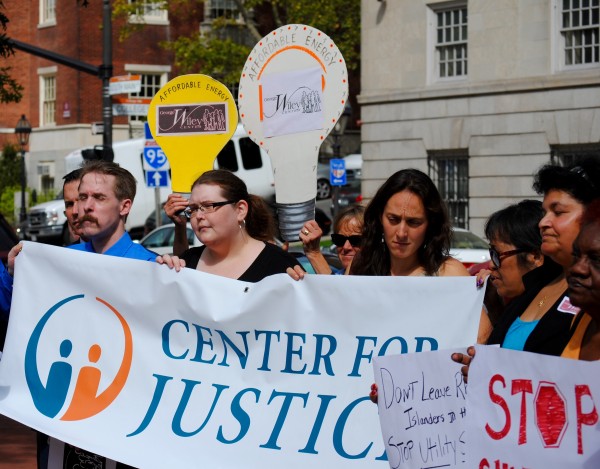 National Grid agreed to restore power to about two dozen homes this afternoon pending the resolution of a lawsuit.
National Grid agreed to restore power to about two dozen homes this afternoon pending the resolution of a lawsuit.
The Rhode Island Center for Justice filed a class action lawsuit against National Grid and the RI Division of Public Utilities and Carriers on behalf of families that had their utilities terminated even though a member of the household suffered from severe or chronic medical conditions. Under state law these families should have been protected from shut-offs pending regulatory review by the RI Public Utilities Commission.
Though the case is not yet over, this move does offer preliminary relief to all families whose circumstances would be covered under the present lawsuit, which the Center for Justice estimates may be as many as 80 homes.
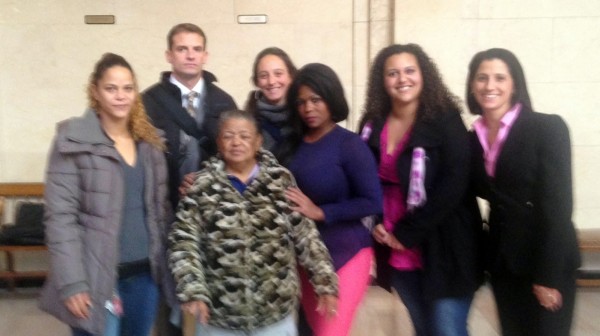
Camilo Viveiros, Executive Director of the George Wiley Center, which collaborated with the Center for Justice on the Lifeline Project, issued the following statement:
Today’s action is important for the families who will have their utilities restored before the holidays and the judgment is a crucial step toward assuring that Rhode Islander’s utility rights and protections are recognized and respected.‘Most Rhode Islanders would be shocked to find that people with serious medical conditions are routinely denied their medical protections stated in the Termination Rules when our taxpayer funded Rhode Island Division of Public Utilities grants National Grid permission to terminate thousands of households with seriously ill people, despite doctors’ documentation of life-threatening medical conditions.
‘The George Wiley Center is glad that it is increasingly coming to light the ways that the rights of utility consumers with medical conditions have been disregarded and disrespected.
‘Today’s action was an important step in recognizing how the RI Division of Public Utilities should be working to utilize the protections for vulnerable families rather than undermining protections in favor of the financial interests of the utility company.
‘The George Wiley Center will continue our efforts with the Rhode Island Center for Justice to expose the continued and larger patterns of utility injustice, as we organize to establish affordable utilities that would allow for access to important and essential utility services.”
[Note: The story originally said that a judge had ordered the restoration of power. In fact, National Grid agreed to restore power without a judge compelling the action]
]]>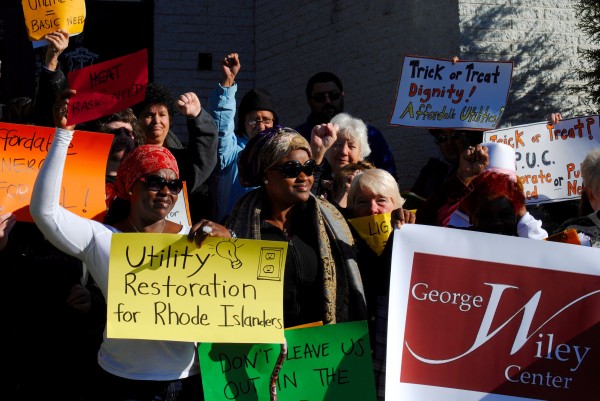 The Rhode Island Public Utilities Commission (RIPUC) today adopted “emergency regulations” designed to make it easier for those who have fallen behind on their payments to National Grid to restore power and heat to their homes. Margaret E Curran, chair of the board, lead fellow commissioners Paul J Roberti and Herbert F DeSimone Jr in an unanimous vote to allow people to get their power restored for a 15 percent payment of the total owed upfront plus the adoption of a regular payment plan. Currently that number can be 50 percent or higher.
The Rhode Island Public Utilities Commission (RIPUC) today adopted “emergency regulations” designed to make it easier for those who have fallen behind on their payments to National Grid to restore power and heat to their homes. Margaret E Curran, chair of the board, lead fellow commissioners Paul J Roberti and Herbert F DeSimone Jr in an unanimous vote to allow people to get their power restored for a 15 percent payment of the total owed upfront plus the adoption of a regular payment plan. Currently that number can be 50 percent or higher.
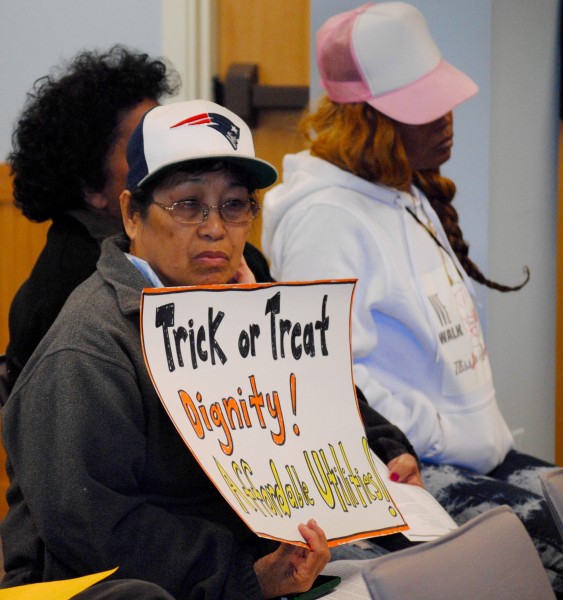 The George Wiley Center made the request on behalf of utility customers, as they have for the last seven years, but had requested the number be set at 10 percent. After some discussion, Curran arrived at 15 percent because in the past there was a tiered system that allowed for down payments of between 10 and 20 percent. Curran eliminated the tiers and came up with 15 percent as a compromise.
The George Wiley Center made the request on behalf of utility customers, as they have for the last seven years, but had requested the number be set at 10 percent. After some discussion, Curran arrived at 15 percent because in the past there was a tiered system that allowed for down payments of between 10 and 20 percent. Curran eliminated the tiers and came up with 15 percent as a compromise.
In the past it was routine to allow these emergency regulations to last for 3 months, but in the last two years this was shortened to thirty days. Curran suggested that the new thirty day mark is somehow “traditional,” though one might argue that recent changes to a tradition are not themselves traditional. Given the shortened time, it’s important, says George Wiley organizer Camilo Viveiros, to get the word out to families and individuals in need.
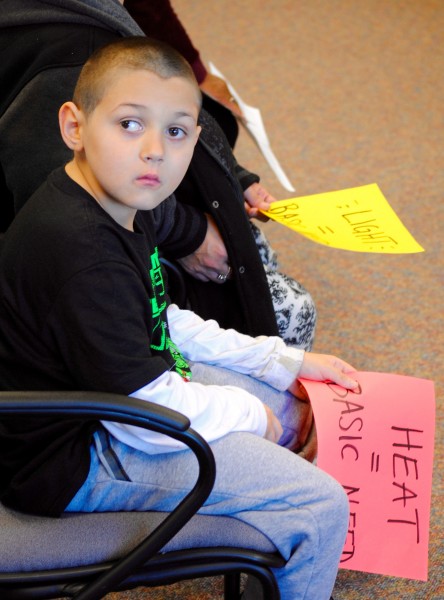 Over thirty people attended today’s RIPUC meeting a good crowd considering the last minute change in date and time of the meeting. Had the board met when originally planned, people would be that much closer to having their power restored. Though the board’s ruling came as a relief to many, to some it will have little effect. Anna told me that she has spent money she might have used to reinstate her gas heat to purchase electric space heaters. In order to have the money back on her debit card in time, she will have to return the space heaters today, wait for the money to be back on her card early next week, and make her payment then. This means that she and her children will be in a house with no heat all weekend.
Over thirty people attended today’s RIPUC meeting a good crowd considering the last minute change in date and time of the meeting. Had the board met when originally planned, people would be that much closer to having their power restored. Though the board’s ruling came as a relief to many, to some it will have little effect. Anna told me that she has spent money she might have used to reinstate her gas heat to purchase electric space heaters. In order to have the money back on her debit card in time, she will have to return the space heaters today, wait for the money to be back on her card early next week, and make her payment then. This means that she and her children will be in a house with no heat all weekend.
Today’s ruling has no effect on those affected by National Grid’s policy of ignoring rules against shutting off power on the elderly and those suffering from illnesses. That lawsuit is still ongoing.
Further complicating this year’s execution of emergency relief is Governor Gina Raimondo‘s executive order 15-07, which will have the impact of delaying this much needed emergency regulation. Under this order, rules adopted by the RIPUC need to be reviewed and signed off on by the Office of Regulatory Reform (ORR) prior to the effective date. Why the governor is mandating the adoption of bureaucratic practices that delay good policy is not yet clear. The governor’s office has been asked for comment. The policy was supported by both Speaker of the House Nicholas Mattiello and Senate President Teresa Paiva-Weed.
Despite these difficulties, today’s ruling is good news for many Rhode Islanders suffering from shut-offs due to financial constraints.
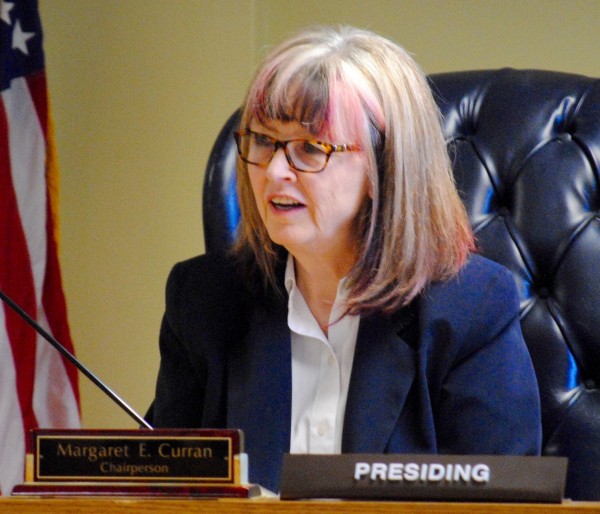
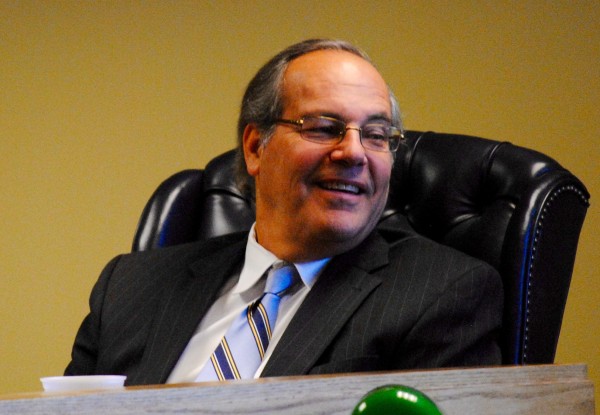
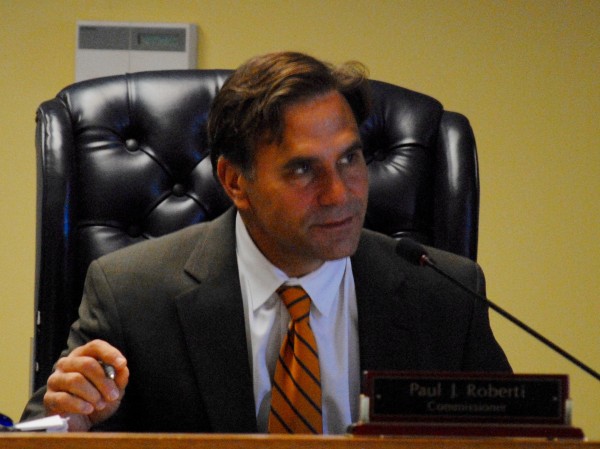
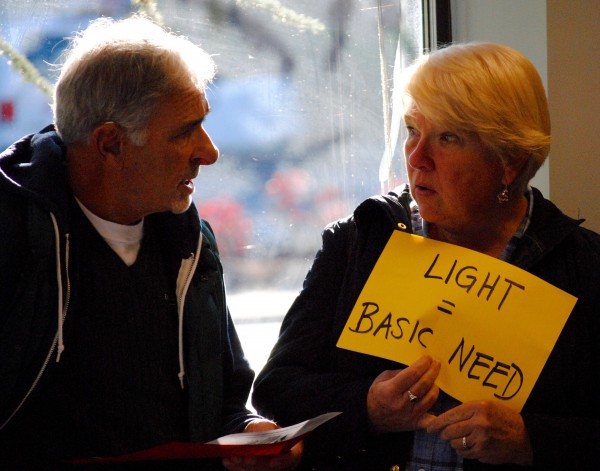
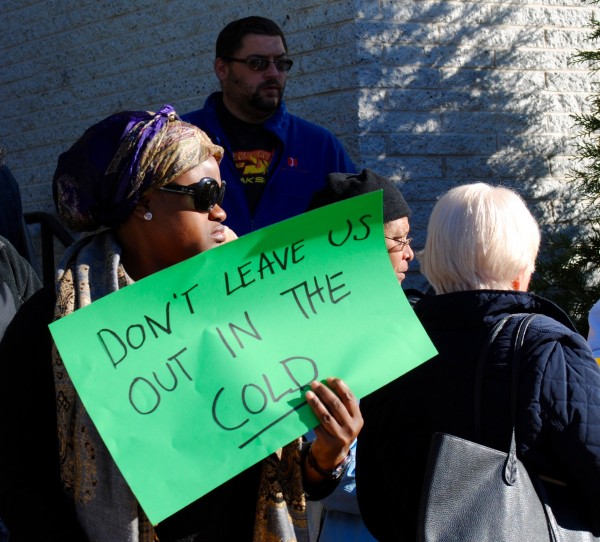
 More than 30 people entered the RI Public Utilities Commission (PUC) yesterday to demand an end to the epidemic of unfair utility shut-offs. Many in attendance have been victims of these shut-offs, even though they complied with the law and produced letters from their doctors indicating that their health would be seriously compromised by shut-offs. The protest was lead by the George Wiley Center and culminated in an action where dozens of protesters entered PUC offices to deliver a letter to the PUC board.
More than 30 people entered the RI Public Utilities Commission (PUC) yesterday to demand an end to the epidemic of unfair utility shut-offs. Many in attendance have been victims of these shut-offs, even though they complied with the law and produced letters from their doctors indicating that their health would be seriously compromised by shut-offs. The protest was lead by the George Wiley Center and culminated in an action where dozens of protesters entered PUC offices to deliver a letter to the PUC board.
No one from the board would consent to meet with the protesters. Instead, Kevin Lynch, who works for the PUC, fed the crowd bureaucratic folderol for 30 minutes. (Readers with a peculiar masochistic streak can watch the entirety of that interaction in the last video below.) Mind you, this was after making the protesters wait in the tiny receiving room/staircase for nearly ten minutes. Ultimately, the letter was time stamped by a clerk before being filed away unread by board members.
Those among the protesters with specific issues left with those issues unresolved.
Though Lynch was professional and polite, he did nothing to resolve any issues that anyone in the crowd brought up. At first Lynch tried to dismiss the protesters by saying that since the George Wiley Center and the Rhode Island Center for Justice was suing over the issue, he would not be able comment, but Camilo Viveiros, lead organizer of the George Wiley Center, countered that the George Wiley center was not a plaintiff in the suit.
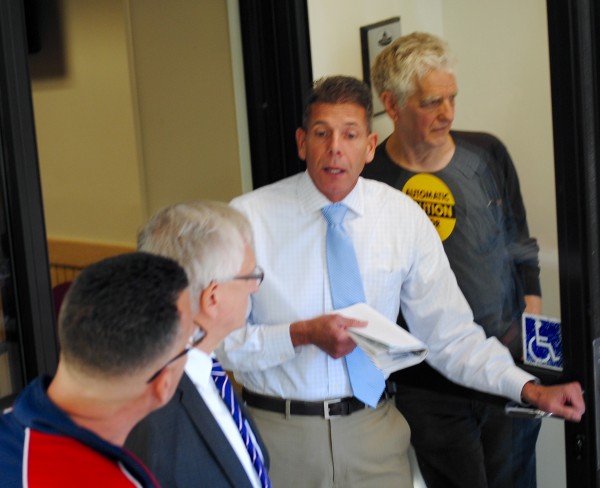 According to a George Wiley Center press release, “Every year tens of thousands of households in Rhode Island experience the stress of utility service termination due to unaffordable bills. It is shocking that in many of these homes live people struggling with medical conditions. This injustice is due to a loophole that allows the state’s Division of Public Utilities to grant National Grid permission to shut off households, even when their medical status is on file.”
According to a George Wiley Center press release, “Every year tens of thousands of households in Rhode Island experience the stress of utility service termination due to unaffordable bills. It is shocking that in many of these homes live people struggling with medical conditions. This injustice is due to a loophole that allows the state’s Division of Public Utilities to grant National Grid permission to shut off households, even when their medical status is on file.”
The Wiley Center says such shut-off are, “inhumane and a threat to public health and safety.”
“Stopping utility shut-offs on people with medical conditions has been recommended by medical professionals who seek to protect and improve health,” says the George Wiley Center, “With access to utility service patients can be warm or cool as needed, see and not stumble in the dark, refrigerate medications, use nebulizers and oxygen tanks, take a warm bath. When service is shut off, basic needs are not met and medical conditions will likely worsen, sometimes leading to hospitalization and other serious consequences.”
Alan Costa has a medical condition that literally stops his heart a hundred times a minute. Without electricity, he dies. He fell behind on his electrical bills while undergoing two complex medical procedures in a very short period of time. He wonders why Governor Gina Raimondo doesn’t use her executive power, as the person who nominates people to the PUC board, to push for enforcement of laws that protect the health and well being of Rhode Island citizens instead on the profits of National Grid.
Annabel Alexander is 77 years old and suffers from a long list of ailments. (She showed me the list!) She has had her heat and her electricity turned off, and sleeps in her overcoat in her bed at night. National Grid will not make a deal with her to catch up on her bills for less than 50 percent of her income. “It’s a damn shame,” she says, “that we have to suffer while they are up there getting paychecks and living in mansions!”
In the next two videos we meet Kevin, who survived the Station Night Club fire. He pulled people out of that building that night, but today suffers from post traumatic stress and other ailments. On Saturday night he ran out of oil. On Monday morning his electricity was turned off. He needs to keep his medication chilled. He was promised that his condition would prevent a shut-off.
“I feel I’m being punished now, for things that people called me a hero for.”
Kevin was invited into the offices to see if there was a possibility of resolving his issue. He left disappointed, his case still pending.
Diane has asked her daughter for help with her bills. National Grid wants to take more than half her paycheck to turn her power back on. She has a host of ailments, and told the crowd that people with arthritis need a hot shower, as opposed to washing yourself of in water you’ve heated up in your microwave…
Camilo Viveiros, lead organizer of the George Wiley Center, rallied the crowd and explained the costs of these utility shut-offs in terms of human misery, but also in terms of dollars wasted.
Here is the full letter the protesters attempted to deliver to the PUC board, and it was signed by a long list of health care professionals, including Dr. Michael Fine, MD, former RI State Director of Health.
I’m writing to express my support for the Lifeline Project’s work to improve protection from utility termination for medically vulnerable households in our State. Unaffordable utility bills are especially prevalent among low-income medically vulnerable households because these households lack the financial resources to make ends meet and often require utility service for ongoing treatment of chronic illness. As a medical professional, I see first-hand the way that termination of utility service can lead to disastrous consequences for families such as an unexpected trip to the emergency room, the loss of a housing voucher, or eviction. Households with a permanently disabled individual, or a person with a pre-existing, serious medical condition such as asthma, chronic obstructive pulmonary disorder, or diabetes, are among the most at risk because these conditions require electric medical devices or refrigerated medication.
The Lifeline Project is a collaboration between the Rhode Island Center for Justice and the George Wiley Center, which aims to protect and expand the rights of medically vulnerable households facing gas and electric utility shut off through the provision of legal assistance and community organizing. The Lifeline Project has identified a host of routinized, unfair and illegal practices and procedures on the part of the public utility company, National Grid, and the state regulatory agencies, the Division of Public Utilities and the Public Utilities Commission with respect to residential utility termination. These practices need to be fixed and in the meantime, medically vulnerable households need protection from shut-off.
I am specifically writing to support the Lifeline Project’s current campaign to challenge these illegal practices and urge National Grid and the state regulatory agencies to meet the following demands:
1. A one-year moratorium on termination for all accounts that are coded as ‘medical’.
2. The engagement of an independent third party monitor to review the Division of Public Utility’s approval of petitions for permission to terminate for all accounts coded as medical. The monitor will be selected by a joint committee composed of members of the George Wiley Center, the medical community, the Department of Health and the Public Utilities Commission.
3. The Public Utilities Commission immediately begin requiring data submissions from National Grid that are consistent with those requirements placed on the company in Massachusetts, as per the George Wiley Center’s formal request from March of 2015.
4. The Public Utilities Commission immediately begin accepting and thoroughly reviewing petitions for emergency restoration and providing timely responses to each request.
As a medical professional in this state, I understand the dire need to protect these consumers from the dangerous impacts of utility shutoff.
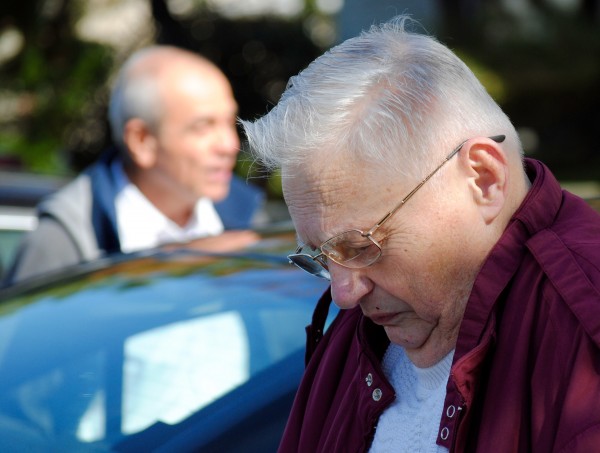
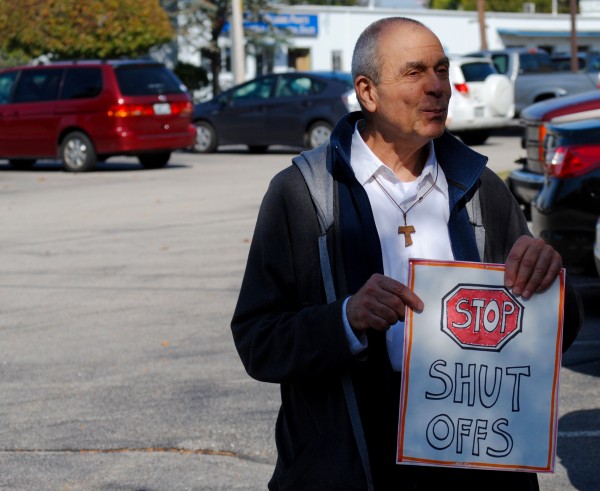
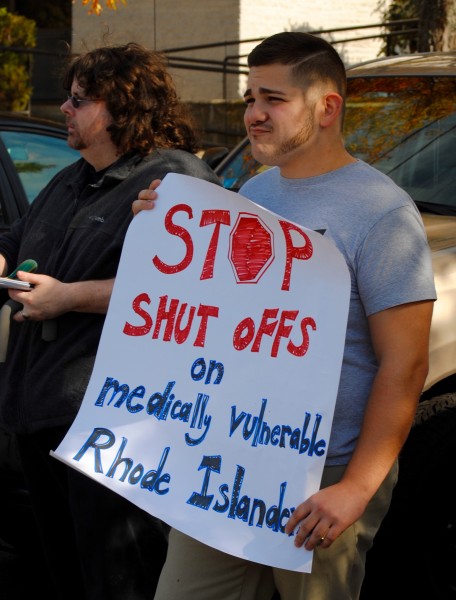
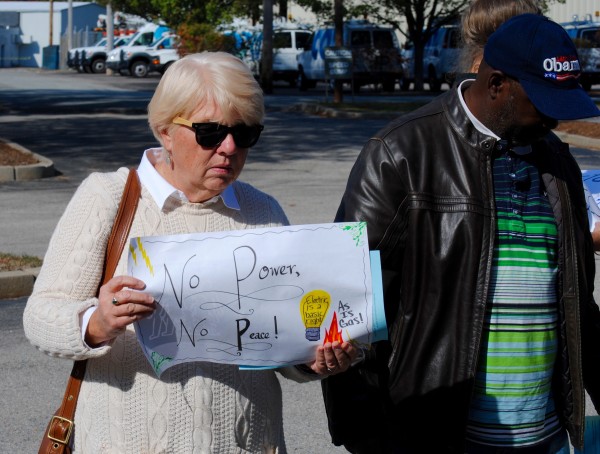
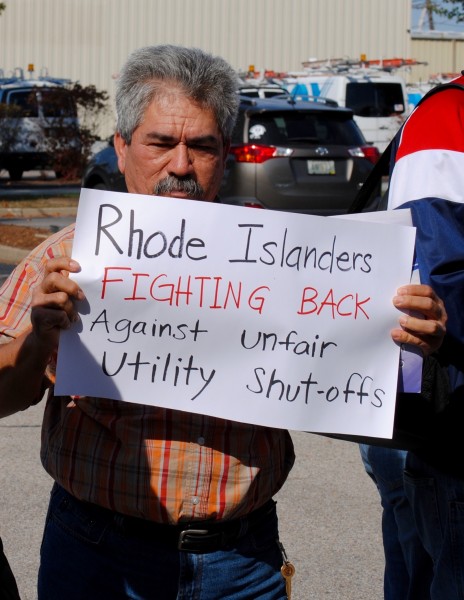

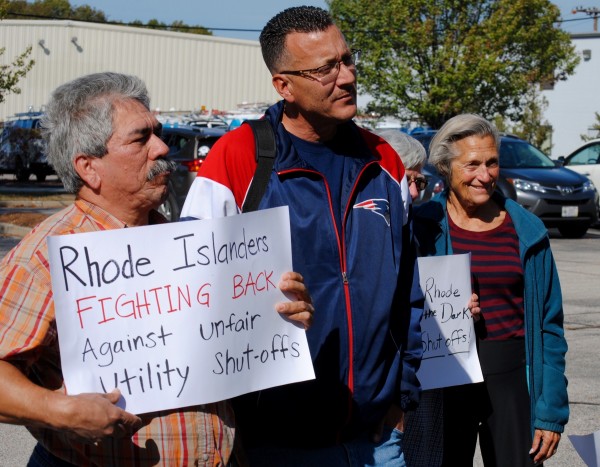


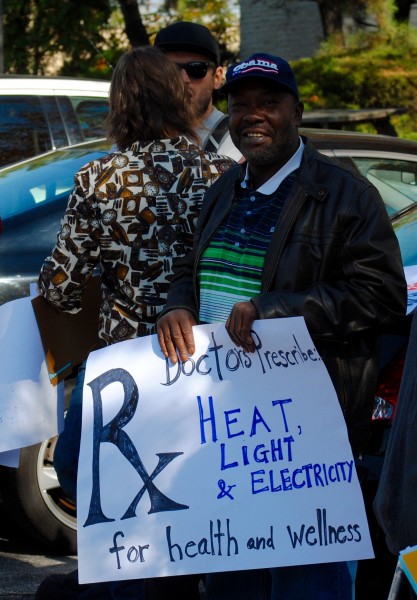
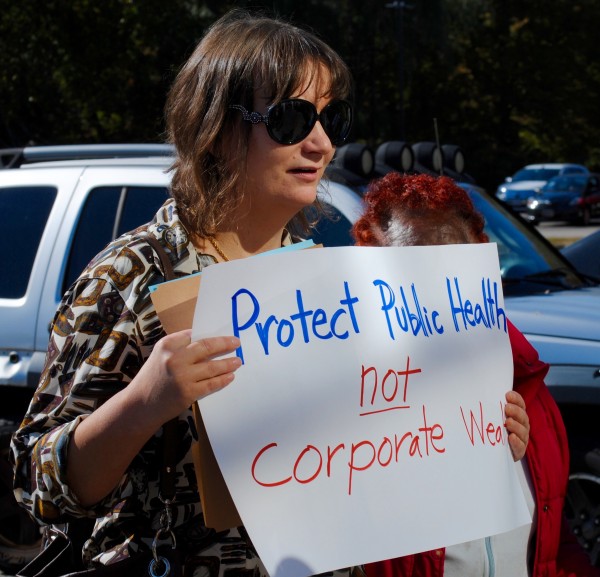
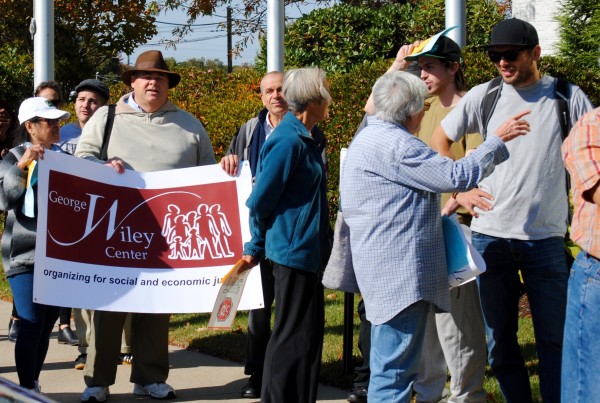
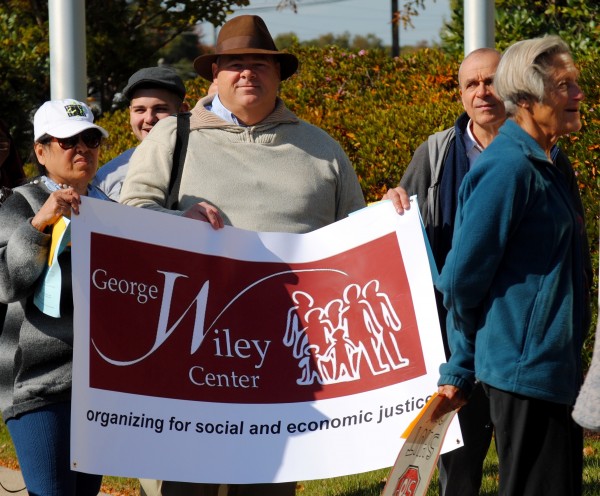
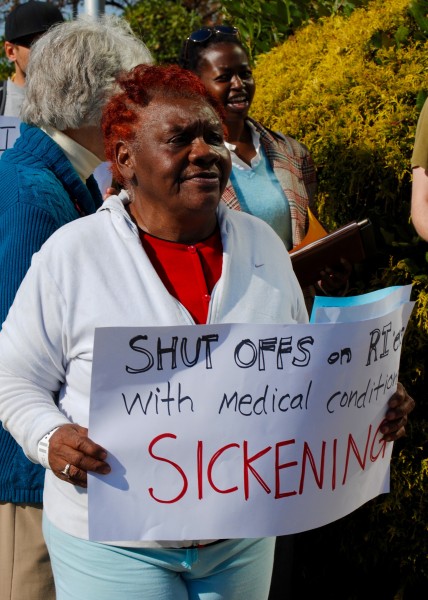
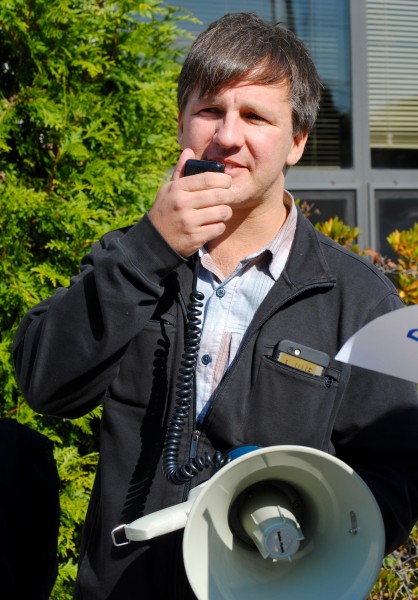

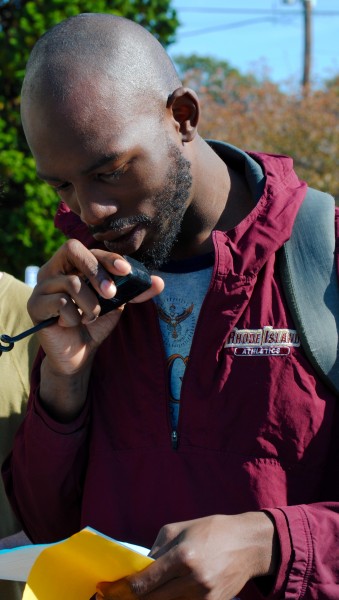
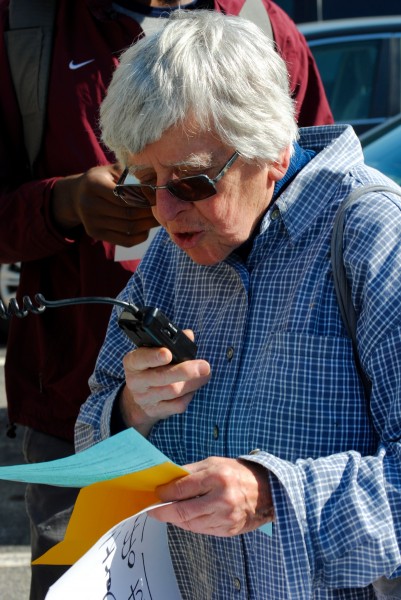
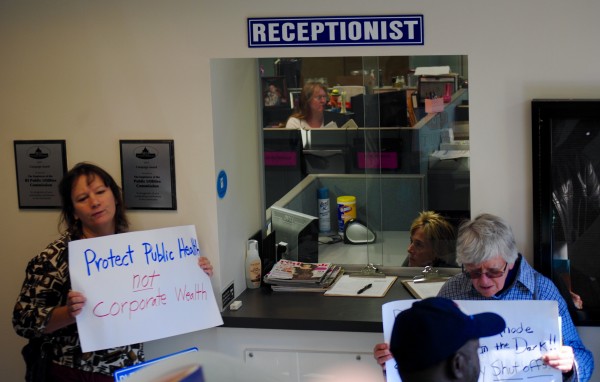
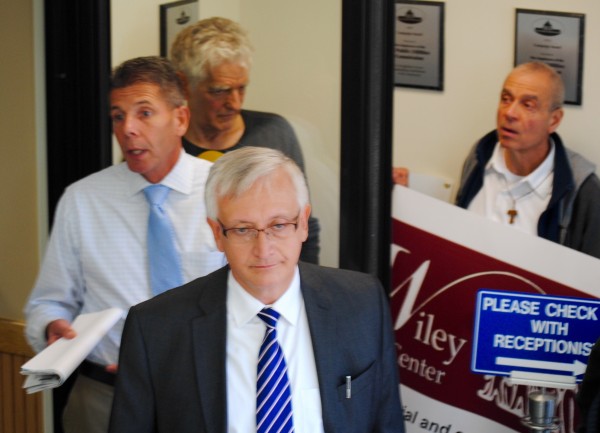
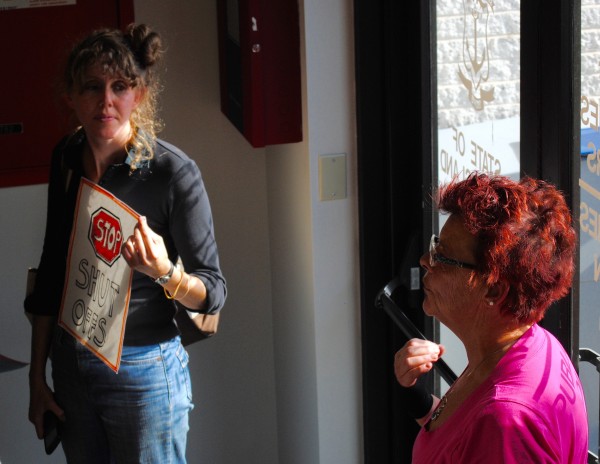
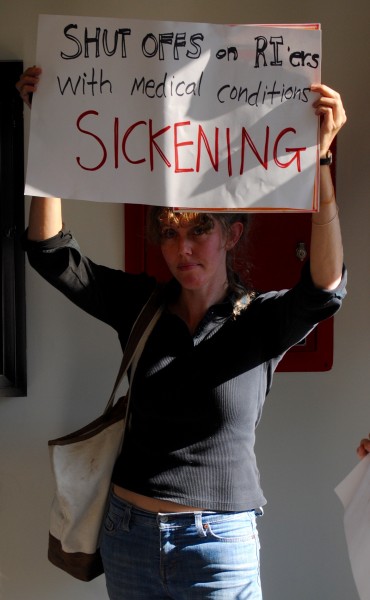
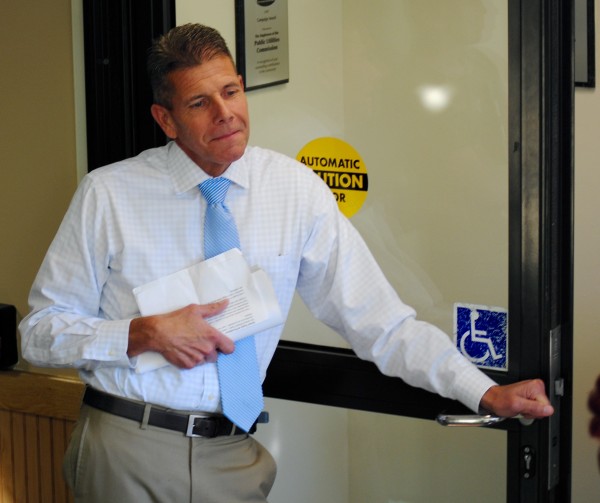
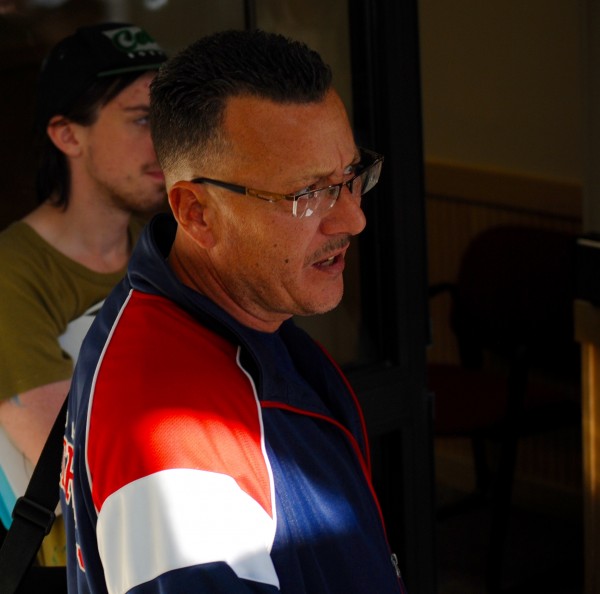

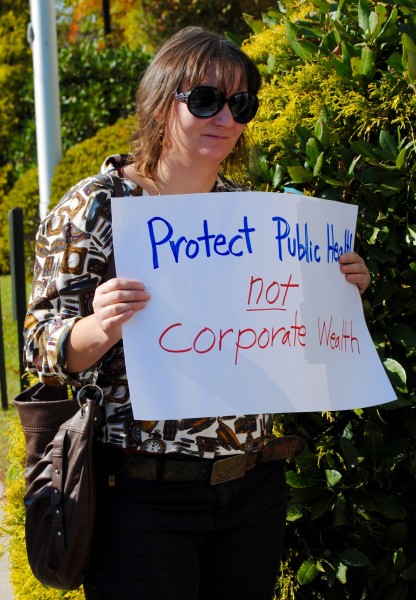
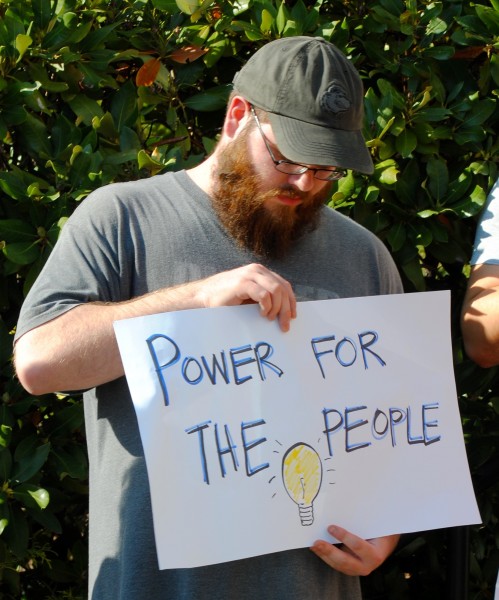
 National Grid and the Rhode Island Division of Public Utilities and Carriers are being sued for turning off the electricity of seriously ill and disabled consumers, putting profits before people’s lives and in violation of Rhode Island state law.
National Grid and the Rhode Island Division of Public Utilities and Carriers are being sued for turning off the electricity of seriously ill and disabled consumers, putting profits before people’s lives and in violation of Rhode Island state law.
The George Wiley Center and the RI Center for Justice have been working together since May to provide free legal assistance to “hundreds of low-income, medically vulnerable utility consumers.” Their collaboration, said Robert McCreanor, RI Center for Justice executive director, lead to the realization that existing state laws were not being enforced. Since National Grid refuses to negotiate in good faith or follow the law, a class action lawsuit was filed Tuesday morning.
The plaintiffs named in the suit, “suffer from severe medical conditions including chronic respiratory failure, which requires electric powered oxygen machines. They asked National Grid to take their medical conditions into consideration when setting up a payment plan for their back bills, as required by law. When National Grid sent shut-off notices without making the required legal determination, these consumers looked to the state regulator of public utilities for protection but were repeatedly denied. Some plaintiffs required emergency medical treatment and hospitalization after their electric and gas services were shut off.”
Shane Ward, one of the plaintiffs in the suit, told the crowd gathered at the press conference about his experience having the electricity turned off at his home, where his 74 year old mother has Alzheimer’s and epilepsy. She requires the use of a respirator. After being told he was in arrears with his bill and given a shut off date, National Grid arrived a week early. When Ward asked for a few minutes to switch his mother to a different respiratory system, he was denied, and the electricity was turned off, sending his mother into an epileptic fit.
Attorneys are requesting immediate relief through a temporary restraining order. Robert McCreanor estimates at least 3,000 Rhode Islanders may be affected by this class action suit. A restraining order would prohibit termination of service to the proposed class and restoration of service for those now shut off.
“The system is broken,” said McCreanor, “National Grid routinely violates the law and the Division of Public Utilities automatically grants the shut offs National Grid requests. The consequences for seriously ill and disabled consumers are costly for our communities.”
Camilo Viveiros, lead organizer of the George Wiley Center, has battled for years on behalf of utility consumers. Many of the laws National Grid seems content to ignore were passed in the RI General Assembly only through the extraordinary lobbying and organizing work of the Wiley Center under the leadership of poverty advocate Henry Shelton.
“We’re simply asking for the rules that are on the books to be practiced, they’re there to protect people. We’re asking the Division of Public Utilities to follow the law…”
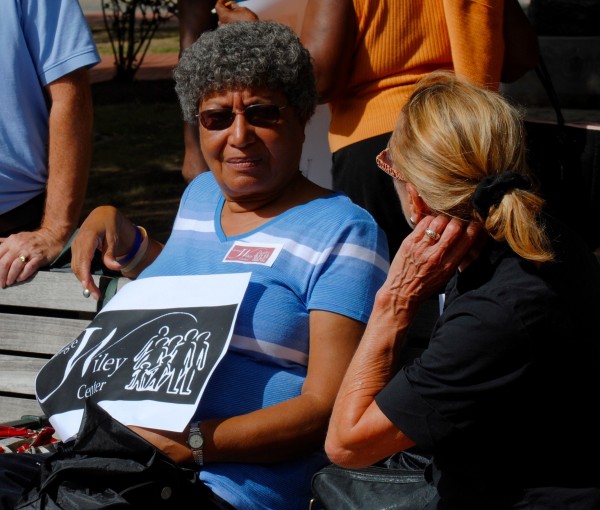
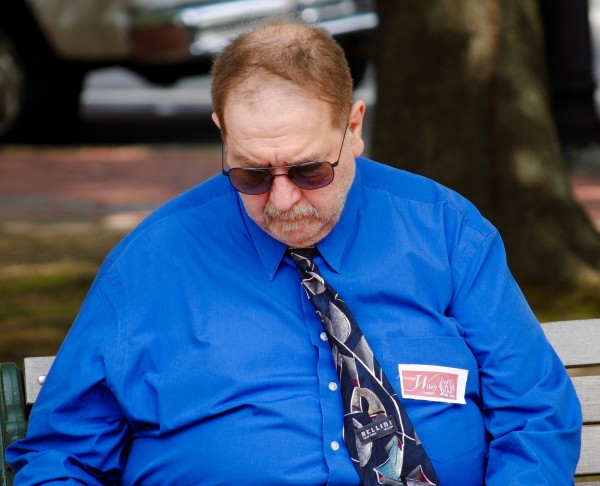
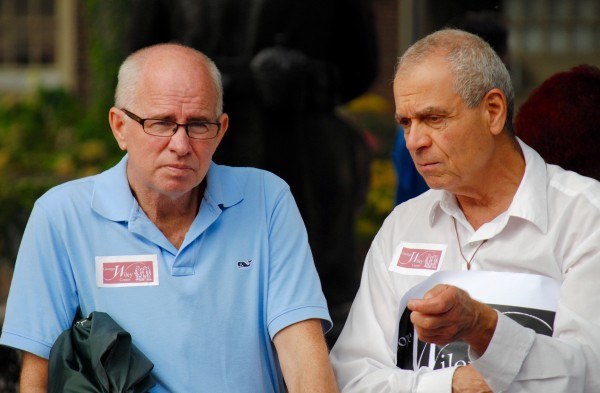
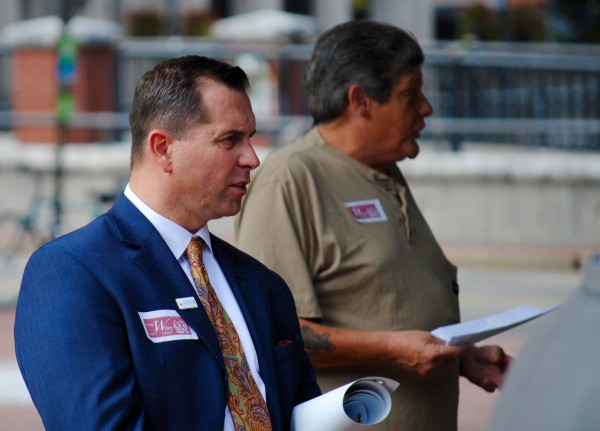
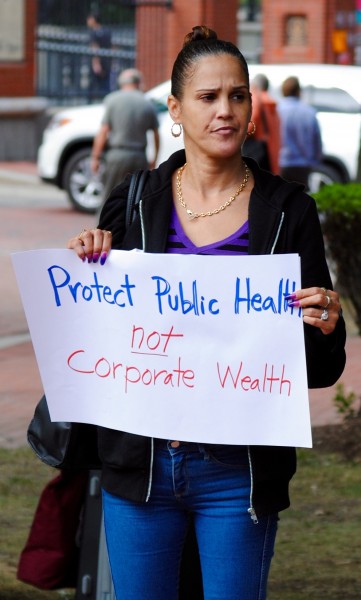
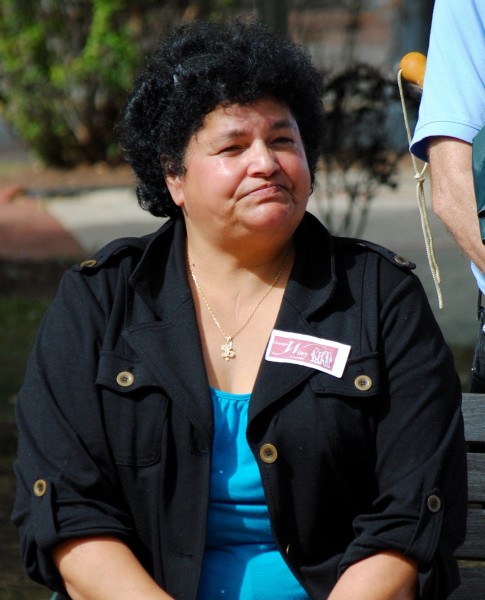
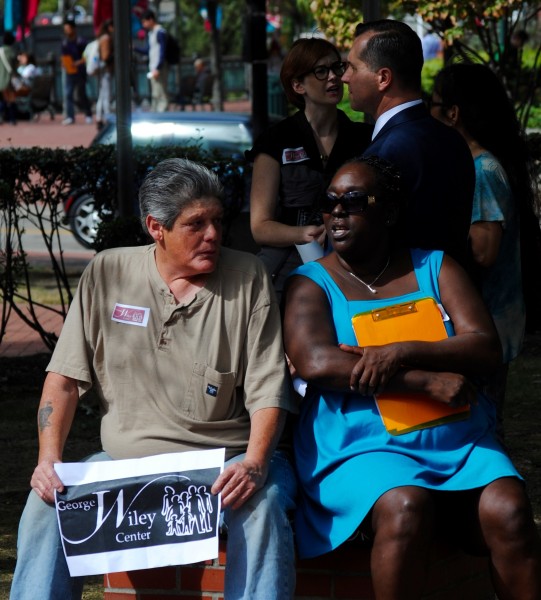
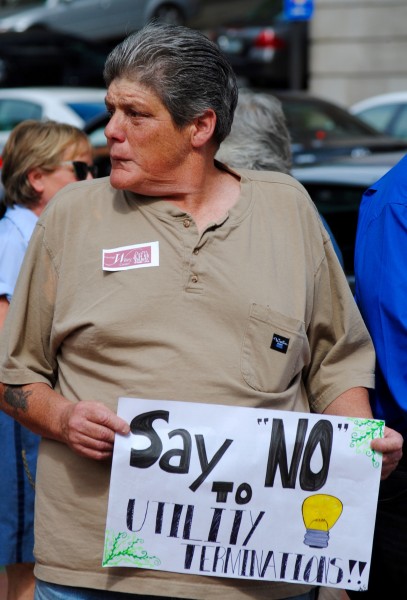
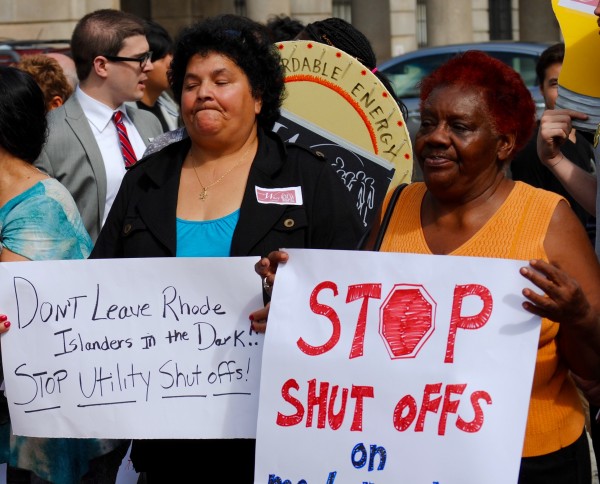
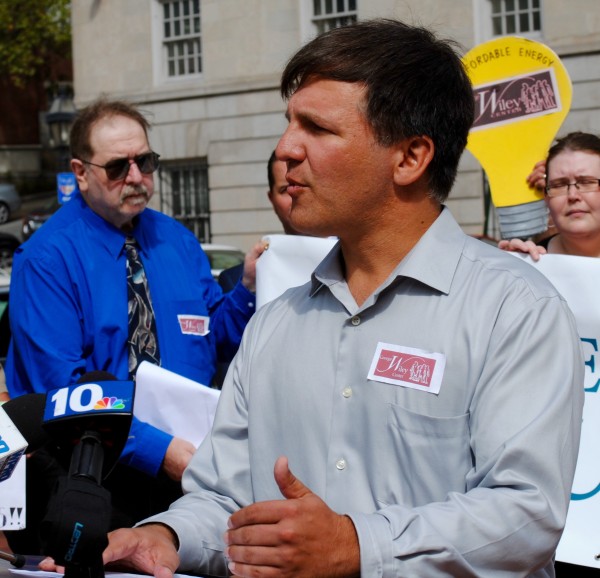

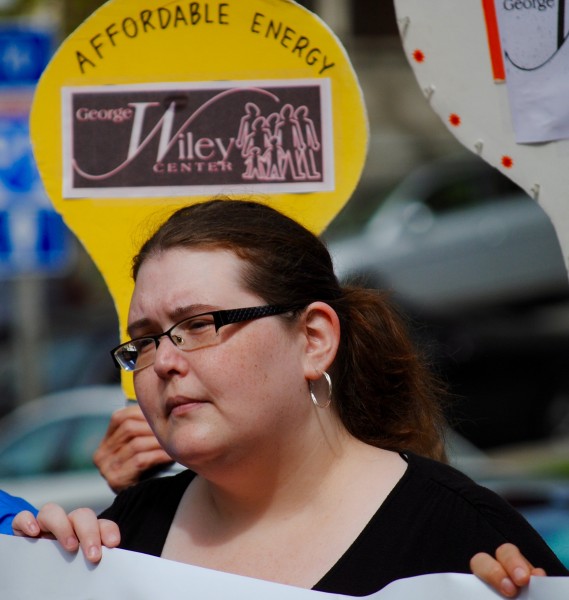
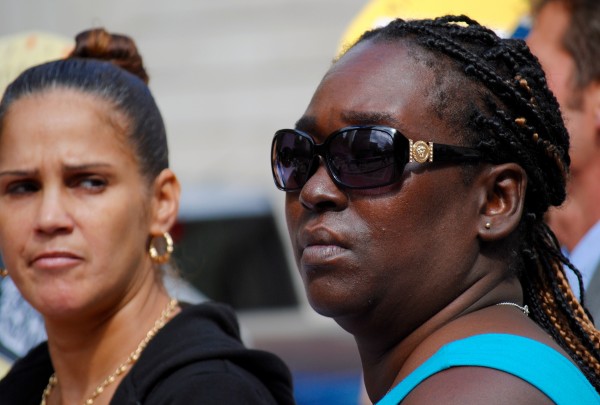
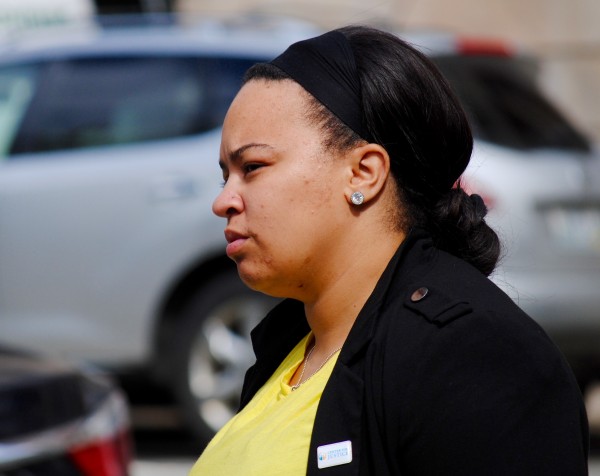
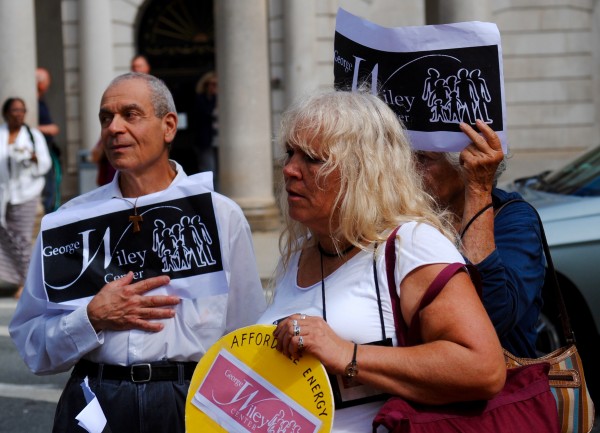
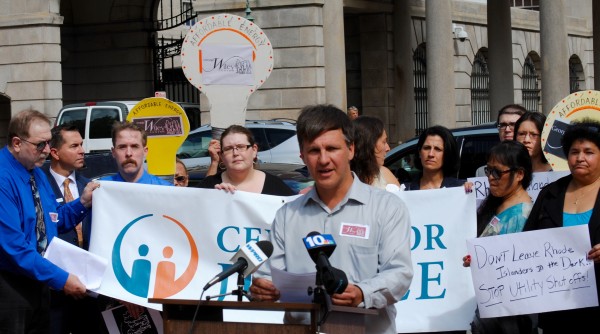
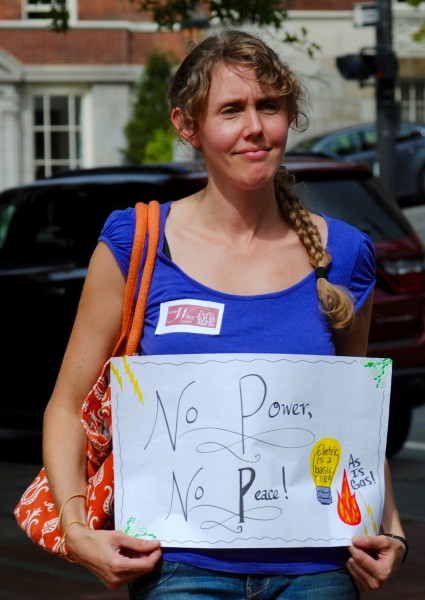

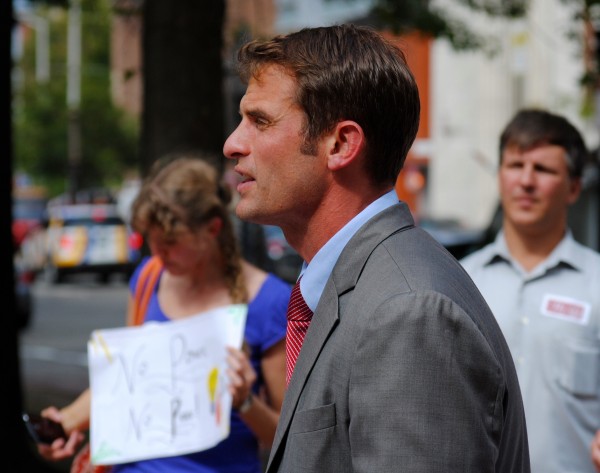
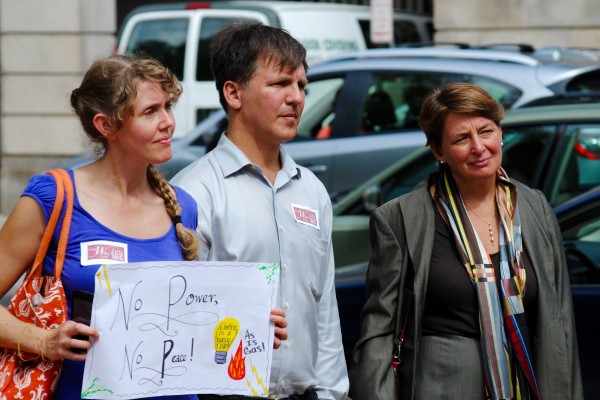
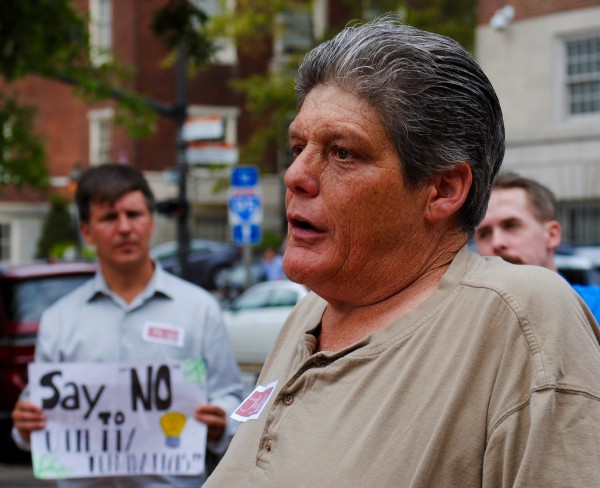
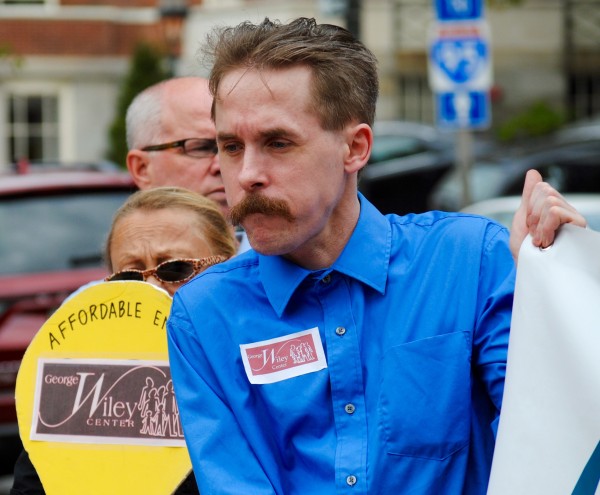
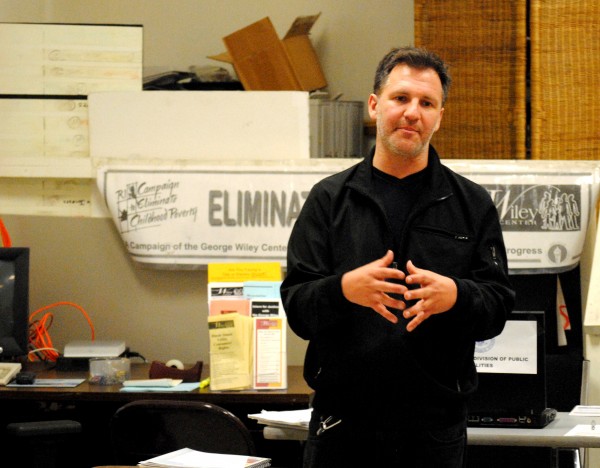
“Thousands are getting shut off notices today,” said Camilo Viveiros, lead organizer of the George Wiley Center to the 22 people gathered around a table hoping to avoid losing power on May 1, “Over 20,000 people in Rhode Island have their power shut off every year.”
Viveiros and the the George Wiley Center want to prevent unnecessary shut-offs. He talked about the Henry Shelton Act, named for the Rhode Island anti-poverty activist who shepherded a bill through the General Assembly that allows for “more than 50% of utility bills” to be forgiven under certain circumstances.
According to a George Wiley Center handout, “Utility Consumers of Rhode Island have… rights under state law and the Rules and Regulations of the Public Utilities Commission (PUC) and Division of Public Utilities and Carriers (Division), which have the ‘jurisdiction to grant an exception to the provision of these regulations to any party for good cause shown.’”
If you’re behind on your utility bills, you have the right to “to both an informal hearing and a formal hearing before an impartial Division Hearing Officer. Utility shut-offs are prohibited until this hearing process is complete.” If a deal can not be made to your satisfaction, you have the “right to appeal the final Division hearing decision to Superior Court.”
You have the “right to an affordable payment plan. The Division has the authority to order payment terms which are less stringent than the applicable Residential Payment Plan.”
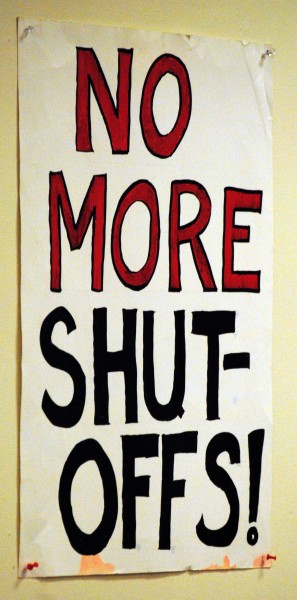 Further, if a customer is seriously ill, or if there is an infant in the home under the age of 24 months, you have the “right to protection” from a utility shut-off. “A lot of people with medical conditions get shut off in the summer time,” noted Viveiros, “A lot of Rhode Islanders would be shocked by that.”
Further, if a customer is seriously ill, or if there is an infant in the home under the age of 24 months, you have the “right to protection” from a utility shut-off. “A lot of people with medical conditions get shut off in the summer time,” noted Viveiros, “A lot of Rhode Islanders would be shocked by that.”
It can pay to know your rights.
There is “the right for a ‘protected’ class of customers to maintain their gas and electric utility services during the Winter Moratorium from November 1st through April 15th. (Protected status for those who are disabled, LIHEAP recipients, seriously ill, unemployed, households with all over 62 years or children under 2 years.)”
You also have the “right to proper representation from the Consumer Unit of the Attorney General’s Office.”
We don’t have these rights, says Viveiros, “because some corporations decided to be nice to us. We had to fight for them.” Often, cautions a flier, “consumers calling the Division for help are turned away without being informed of their rights or about how to use the law.” Viveiros and the George Wiley Center are trying to fix that problem.
To that end the George Wiley Center has scheduled a series of trainings and will be happy to guide people through the sometimes difficult process of dealing with out of control utility bills. They’ve developed a 10 point plan of action:
- Call the George Wiley Center to see if a member or volunteer is able to accompany you at the hearing. Also, ask supportive family members, friends, your elected officials, etc. to attend your hearing or offer letters of support.
- Start making some kind of payment before your hearing, even a small amount. This will show a good faith effort when your payment history is discussed at the hearing.
- Put together a “monthly budget”, the amount of your income minus all the bills that must be paid. Ex. Rent, food, medication, gas or oil, electricity, other utilities, etc. Have it written or typed out, and bring it with you to the hearing.
- Prepare to tell your story, your special circumstances, including personal hardship such as unemployment, medical issues, children, divorce, etc. Let the Division hear what it is like to be you, to not have enough to afford your high payment plans for utilities that you can’t live without. Be prepared for the utility company representative to have a history of your payments, including missed and defaulted. Document all attempts you have made to request assistance, and if it they were denied, such as LIHEAP, Salvation Army, the Diocese, churches.
- On the day of the hearing, arrive early to meet with your supporters beforehand.
- Shut off cell phones and tuck them away during the hearing.
- Share your story, monthly budget, and individual hardship circumstances with the Division. Tell them you want to pay the bills and what you can afford.
- Do not make a deal at the hearing unless you really can afford the payments. Make sure the Hearing Officer tells you they have up to thirty days to make a decision on a payment plan.
- Stay in contact with the George Wiley Center, update us as soon as you get the written response from the Division.
- Attend meetings and actions to strengthen protections and improve policies that impact all RI utility consumers.
When people deal with utility companies unprepared, they will accept deals that only serve to plunge them into deeper debt. Noting that National Grid made $4 billion last year, Viveiros said, “We don’t need people to go home and feel depressed because they don’t have the money to give to people who are doing well.”
A woman told the story of having her electricity turned off. She learned that her gas stove required electricity to work, meaning she couldn’t cook. Her gas heat required electricity, meaning she had no heat. She ended up borrowing money from her children, running the risk of messing up her children’s finances. The woman felt shame, guilt and helplessness, simply because she fell behind on her bills.
No one is poor by choice. It is essential that we know our rights and come together as a community to compel large corporations to treat us with respect and dignity. “We’re trying to create a caring community,” says Viveiros, “where it isn’t all about the bills.”
Contact:
George Wiley Center, 32 East Ave, Pawtucket, RI 02860
cell: 401-338-1665 office: 401-728-5555
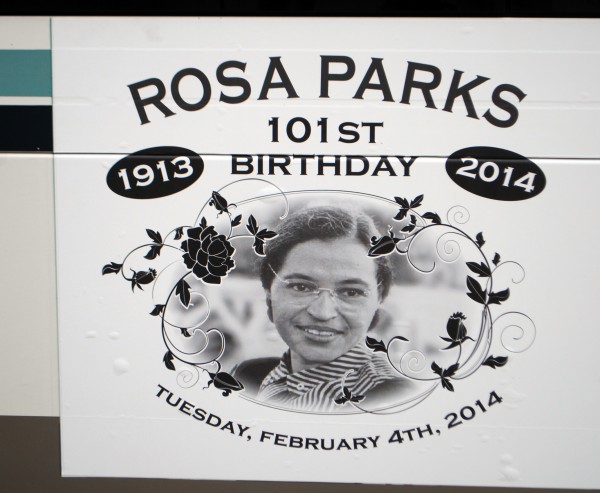 Civil rights activists spoke yesterday in South Providence as part of the seventh annual Rosa Parks Civil Rights Day Commemorative. The speakers drew parallels to Rosa Parks’ brave action of 59 years ago when she was arrested for refusing to give up her bus seat to a white passenger in Montgomery and the rising protests against racial profiling and the militarization of the police today, highlighted by events in Ferguson.
Civil rights activists spoke yesterday in South Providence as part of the seventh annual Rosa Parks Civil Rights Day Commemorative. The speakers drew parallels to Rosa Parks’ brave action of 59 years ago when she was arrested for refusing to give up her bus seat to a white passenger in Montgomery and the rising protests against racial profiling and the militarization of the police today, highlighted by events in Ferguson.
The speakers highlighted some of the differences in tactics among the various activists and groups, but all agreed that the activism of Rosa Parks and the election of Barrack Obama as president was not the end of the fight against systemic racism in America. There’s still a lot of work to be done.
Malcus Mills is a prominent member of DARE, as well as a member of the Rosa Parks Human Rights Committee and the Peoples Assembly.
“If you look back through history, change has never happened quickly, and never without those who have lost their lives…”
Joe Buchanan is a member of the Rosa Parks Human Rights Committee.
“In 1955 I was three years old when Rosa Parks, this working Black woman got on the bus. She is one of the many great Black women through history…”
Providence City Councillor elect for Ward 11, Mary Kay Harris, is also a member of the Rosa Parks Human Rights Committee.
“It’s very important that we continue to look at human rights, the rights of people, the right for a movement, the right of people to have a voice…”
Native American Ray Two-Hawks Watson gave a fiery speech in defense of last Tuesday night’s Ferguson protesters who blocked the highway here in Providence.
“…everybody was up in arms about it. Oh, it was dangerous and this, that and the other, but to that I say it’s dangerous being a youth these days. Because not only do you have to worry about gangs, not only do you have to worry about drug dealers and all that but you also have to worry about police officers who should be protecting you from those elements treating you like you’re one of them.”
Sheila Wilhelm, of Direct Action for Rights and Equality (DARE) was unapologetic in her defense of the protesters.
“Dr. King said, ‘Riots are the voices of the unheard,” and it’s a shame sometimes what we have to do to get our voices heard, but also, ‘by any means necessary.’ Especially, especially when we’re fighting for our children… Personally, when I saw the actions of last week and the protests, I was humbled. I was honored and I was so, so, so proud…”
Jim Vincent, of the Rhode Island branch of the NAACP was one of the more vocal critics of blocking the highway, but he kept his comments here to Rosa Parks and civil rights in general.
“We’ve always heard things in America like, ‘We hold these truths to be self evident, that all men and women are created equal’ and “justice and liberty for all’ but where has that been over the decades for people of color and black people in particular?”
Lauren Niedel of the Rhode Island Progressive Democrats saw the great lady as an example, and said, “Everybody here can be a Rosa Parks.”
Camilo Viveiros of the George Wiley Center tied racial to economic justice.
“Economic injustice has caused many to not have utilities throughout the year…. There continues to be a war against poor people, but many have given up on the war on poverty…”
Freethinker Peter Nightingale, of Occupy Providence and Fossil Free RI, gave a wonderful, and the most radical talk of the bunch.
“We need to change everything to break the chains of predator capitalism… We need degrowth, and we need a four hour workday. Degrowth means shrink the economy. I said it, put it on TV. He’s nuts…”
After the speakers there was a re-enactment of Rosa Parks’ nonviolent resistance on board a RIPTA bus, which was crowded to overflowing with onlookers and news cameras. Deborah L. Wray played the part of Rosa Parks.
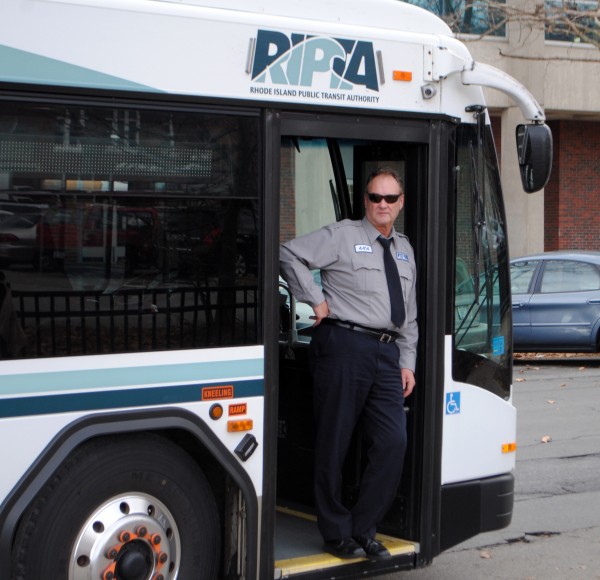
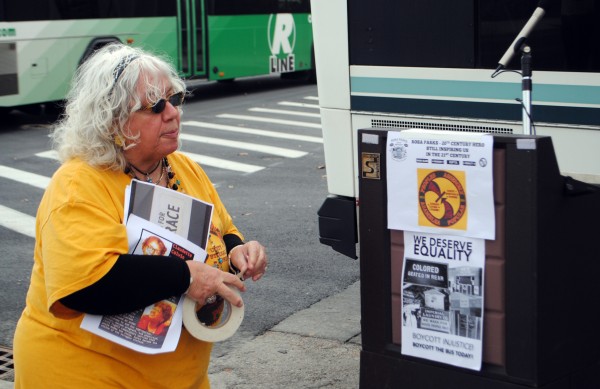

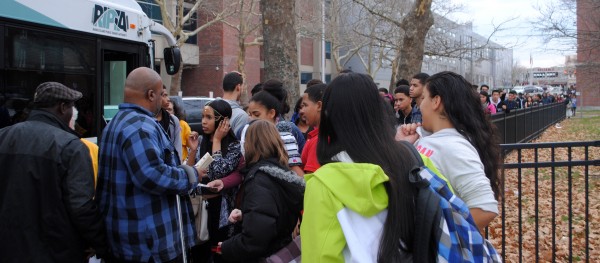
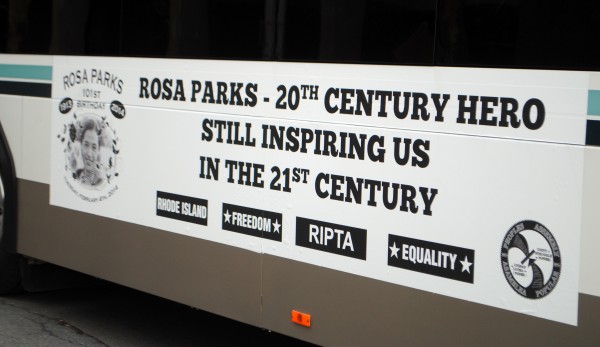
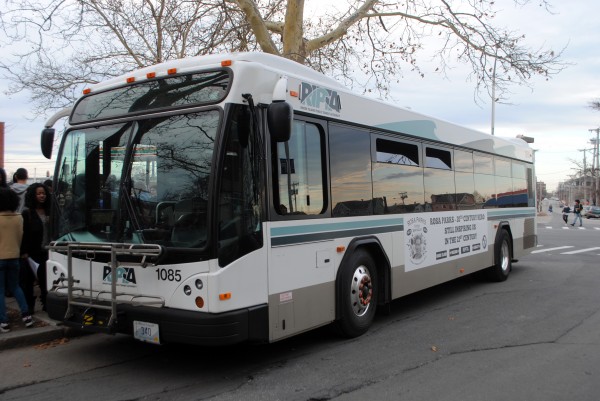
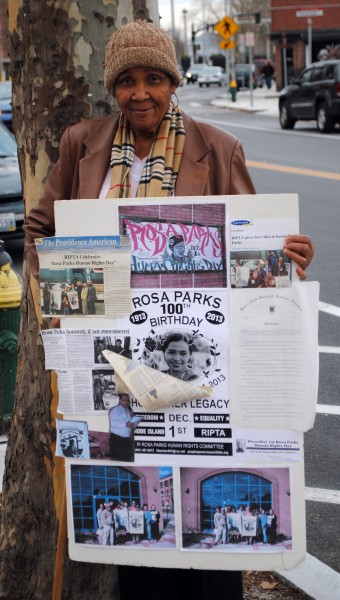
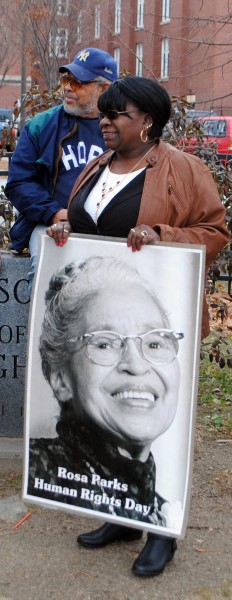
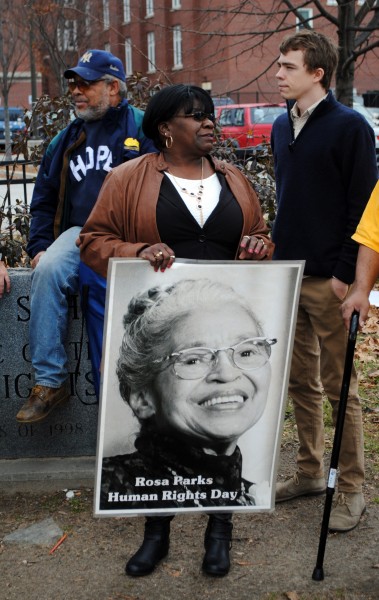
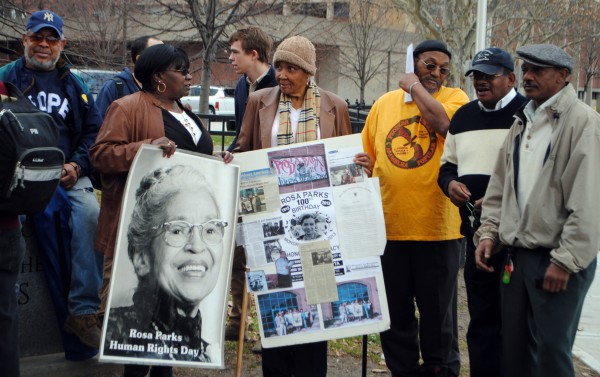
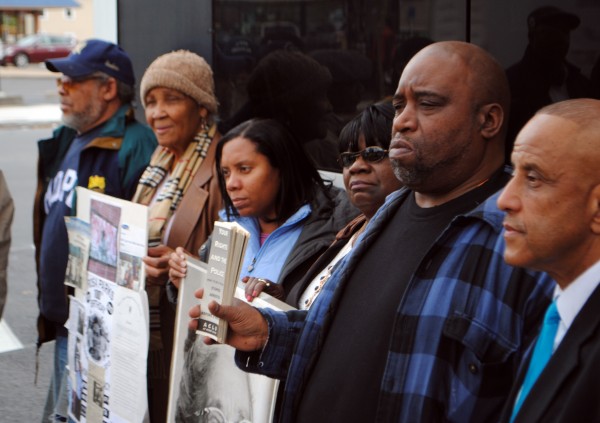
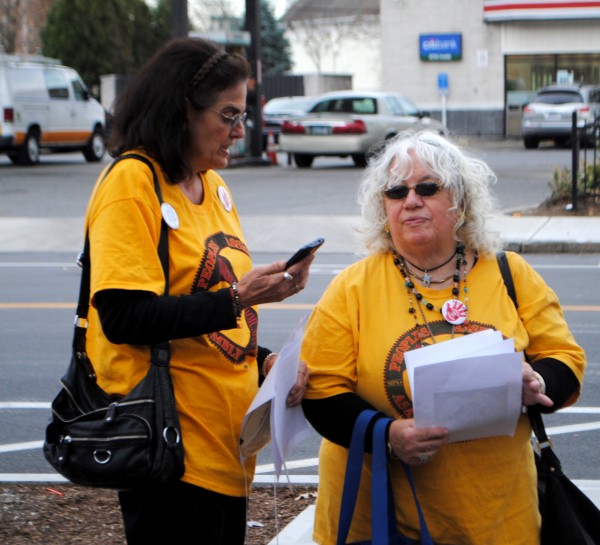

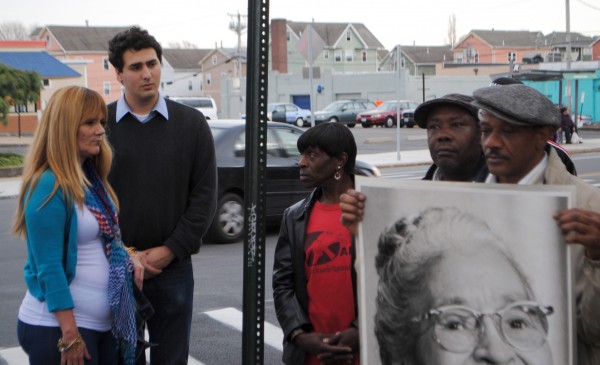
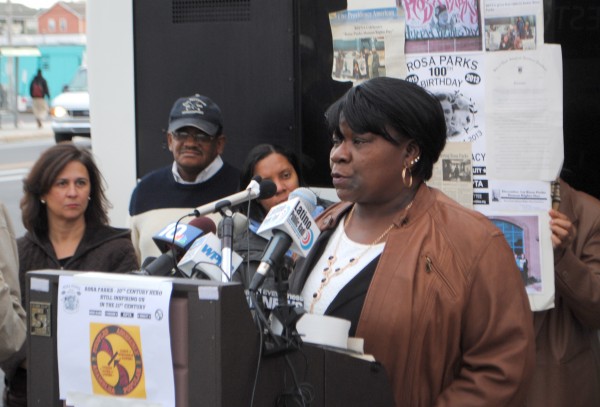
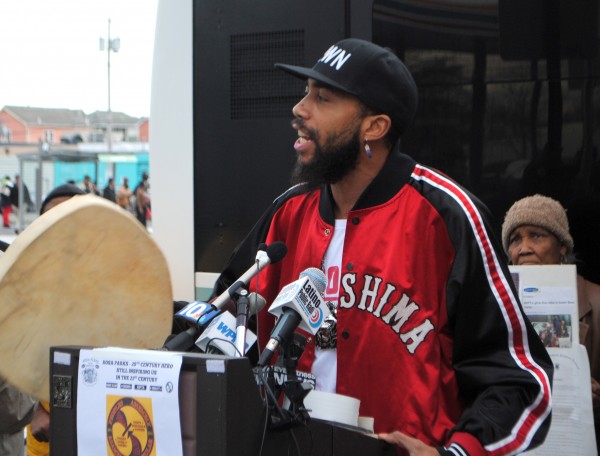
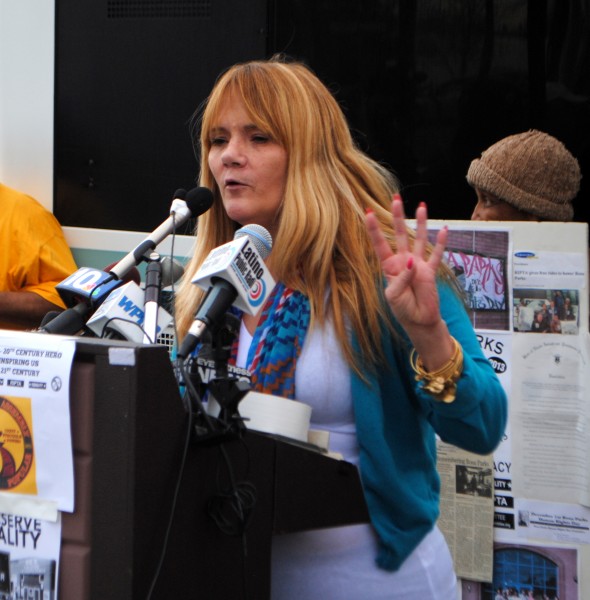
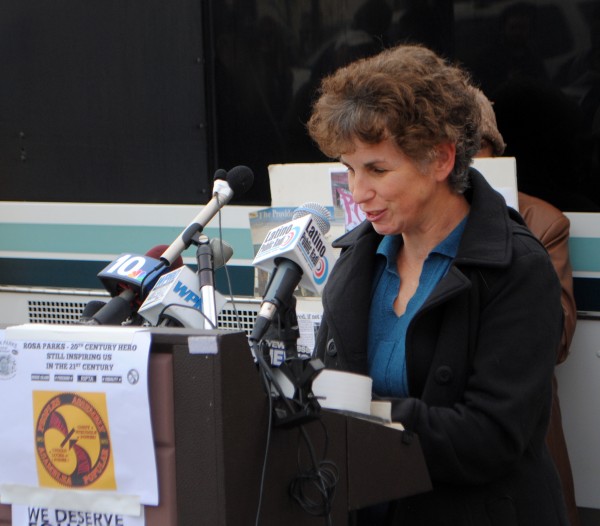
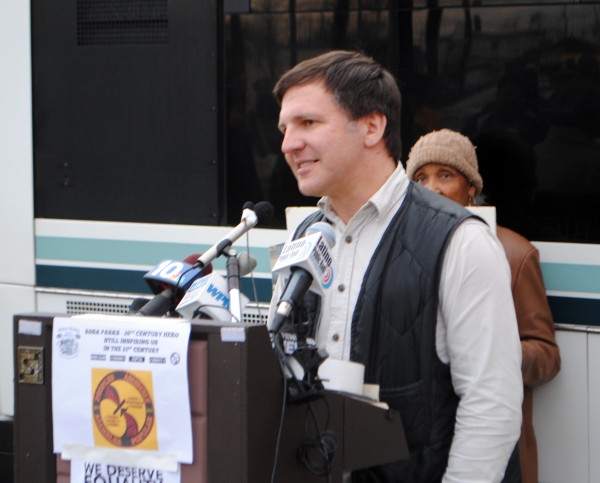
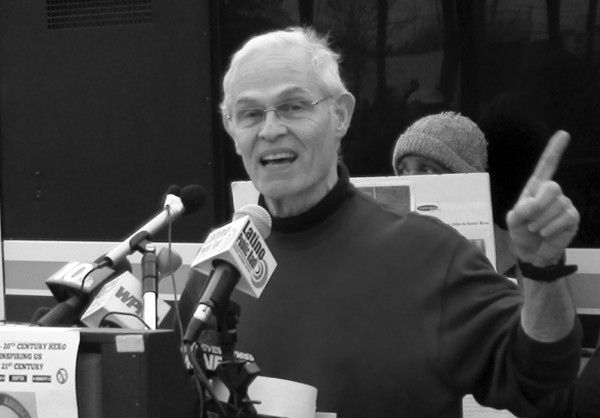
Support Steve Ahlquist!
]]>